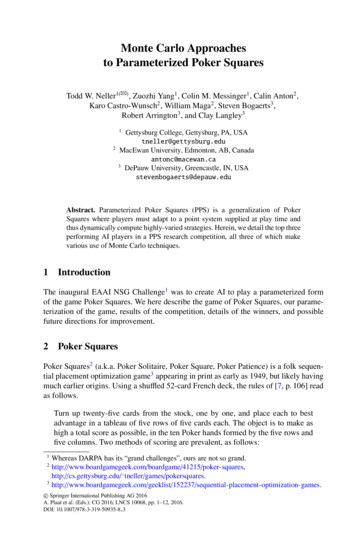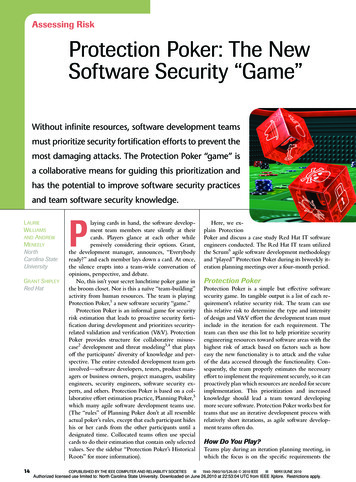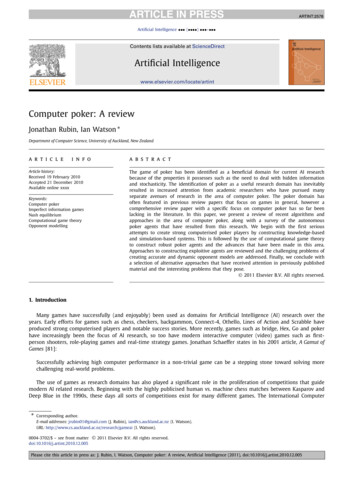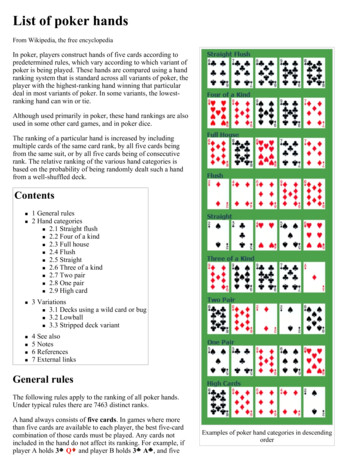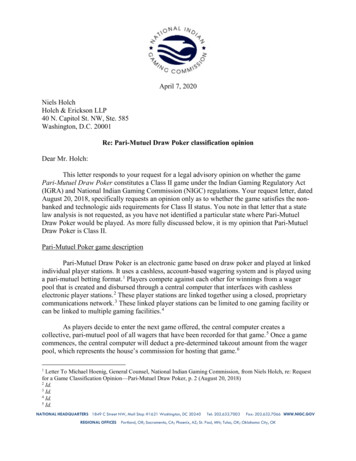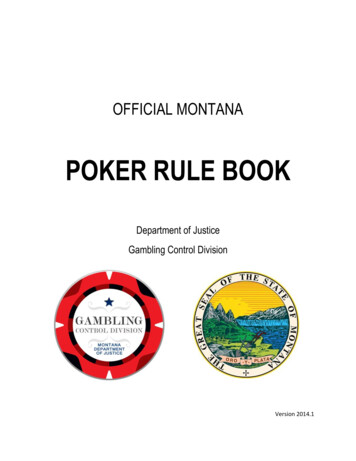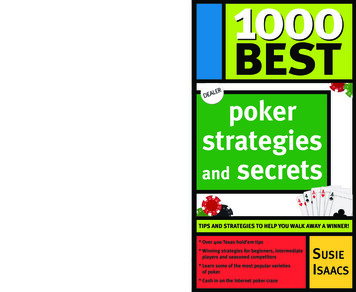
Transcription
1000THINK, PLAYAND WIN LIKEA POKER PRO!1bestRaise your game with strategies from pokerpro and back-to-back World Series of Pokerladies championship winner SUSIE ISAACS!* Talk the talk with the help of the comprehensiveglossary of poker terms* Learn how to make the most profit out of a big hand and when to make a big lay down* Find out how home poker games and Internet pokercompetitions can pave your way to the major league,big money tournaments for minimal investment* Learn how to use other players’ mistakes andweaknesses to your advantage* Study words of wisdom from some of today’s toppoker players* Don’t look like an amateur—get to know the do’s anddon’ts of poker etiquetteGames/Gambling 12.95 U.S.UPCDevelop the skills that will help you win big! 17.95 CAN 6.99 UKISBN-13: 978-1-4022-0668-9ISBN-10: 1-4022-0668-2poker strategiesand secrets* Learn the ins and outs of Texas hold’em (limit and nolimit), Omaha, seven-card stud, razz, lowball and moreSUSIEISAACS1000bestpokerstrategiesand secretsTIPS AND STRATEGIES TO HELP YOU WALK AWAY A WINNER!* Over 400 Texas hold’em tips* Winning strategies for beginners, intermediateplayers and seasoned competitorsEAN* Learn some of the most popular varietiesof poker* Cash in on the Internet poker crazeSUSIEISAACS
1000 BestPokerStrategiesandSecretsSusie Isaacs
Copyright 2006 by Susie IsaacsCover and internal design 2006 by Sourcebooks, Inc.Sourcebooks and the colophon are registered trademarks ofSourcebooks, Inc.All rights reserved. No part of this book may be reproducedin any form or by any electronic or mechanical meansincluding information storage and retrieval systems—exceptin the case of brief quotations embodied in critical articles orreviews—without permission in writing from its publisher,Sourcebooks, Inc.This publication is designed to provide accurate and authoritative information in regard to the subject matter covered. Itis sold with the understanding that the publisher is notengaged in rendering legal, accounting, or other professionalservice. If legal advice or other expert assistance is required,the services of a competent professional person should besought.—From a Declaration of Principles Jointly Adopted bya Committee of the American Bar Association and a Committee of Publishers and AssociationsPublished by Sourcebooks, Inc.P.O. Box 4410, Naperville, Illinois 60567-4410(630) 961-3900Fax: (630) 961-2168www.sourcebooks.comLibrary of Congress Cataloging-in-Publication DataIsaacs, Susie.1000 best poker strategies and secrets / Susie Isaacs.p. cm.Includes bibliographical references.ISBN-13: 978-1-4022-2020-3978-1-4022-0668-9ISBN-10: 1-4022-2020-01-4022-0668-21. Poker. I. Title: One thousand poker strategies and secrets.II. Title.GV1251.I83 2006795.412—dc222005033345Printed and bound in Canada.WC 10 9 8 7 6 5 4 3 2 1
ContentsAcknowledgments . . . . . . . . . . . . . . . . . . . . . . . . . . .viiIntroduction . . . . . . . . . . . . . . . . . . . . . . . . . . . . . . . . .xiPoker Basics . . . . . . . . . . . . . . . . . . . . . . . . . . . . . . . . . .1Glossary . . . . . . . . . . . . . . . . . . . . . . . . . . . . . . . . . . . . .71: Limit Texas Hold’em . . . . . . . . . . . . . . . . . . . . . . .232: No-Limit Texas Hold’em . . . . . . . . . . . . . . . . . . .833: Seven-Card Stud . . . . . . . . . . . . . . . . . . . . . . . . .1434: Razz . . . . . . . . . . . . . . . . . . . . . . . . . . . . . . . . . . . .1755: Seven-Card Stud HighLow Split Eight-or-Better . . . . . . . . . . . . . . . . . .1896: Omaha . . . . . . . . . . . . . . . . . . . . . . . . . . . . . . . . . .2117: Omaha High-Low Split Eight-or-Better . . . . .2258: Five-Card Draw Jacks-or-Better,Jacks-Back, and Lowball Draw . . . . . . . . . . . . .2459: Tells . . . . . . . . . . . . . . . . . . . . . . . . . . . . . . . . . . . . .263
10: Home Games . . . . . . . . . . . . . . . . . . . . . . . . . . .27511: Internet Poker . . . . . . . . . . . . . . . . . . . . . . . . . . .28712: Brick-and-Mortar Card Casinosand Poker Rooms . . . . . . . . . . . . . . . . . . . . . . .31113: Poker Table Protocol . . . . . . . . . . . . . . . . . . . . .32914: My Friends Give Big Tips . . . . . . . . . . . . . . . . .345Bibliography . . . . . . . . . . . . . . . . . . . . . . . . . . . . . . .376About the Author . . . . . . . . . . . . . . . . . . . . . . . . . . .377
DedicationThis book is dedicated to my mom, “Mimi.” Shenever played a hand of poker in her life, but she wasmy biggest fan.
AcknowledgmentsSince I began this project, my list of appreciation forcertain individuals has grown almost daily. It isn’teasy to write a book, even if writing and the subjectmatter you are writing about is your passion,especially if the information is sometimes technical.It is so important to get the details correct if yourhope is to direct others in their passion or in theirpursuit to learn and excel in a multifaceted subject.One misdirection—one “do” when you shouldn’t, orone “don’t” when you should—could end in ultimateconfusion. I believe with the help, suggestions,corrections, and directions of a bunch of good folks,this work resulted in a great book.If I have forgotten anyone, I’ll run down the LasVegas Strip naked (in my next life!).Thank you Jessica Faust, my literary agent fromBook Ends, Inc., for finding me. You led me out ofthe darkness of “What do I do now?” to the light of apublisher, Sourcebooks, Inc.Thank you Sourcebooks, Inc. for gambling onme. Although lots of people, especially poker people, know me, I was a virtual unknown in the worldof publishing.
Maryann Guberman, my poker editor, thank youfor making me look totally literate. I know that time isa precious commodity and I appreciate your makingenough of it to help me out with this project.Ewurama Ewusi-Mensah, thank you for yourtime and efforts in polishing this manuscript. If youweren’t a poker player before, you are now!Michelle Schoob, thank you for checking andrechecking my poker terminology. I don’t know ifevery writer needs multiple editors, but I sure did!Thank you Herminia Mahealani Suzanna Sniffen(that’s why we call her “Hermie”), my businesspartner, for carrying the load and being so patientwhile I buried myself in this project.Thank you Darlene Wood, my friend and myresearch assistant. If it weren’t for you, this wouldhave taken me twice as long.Thank you Linda Johnson for believing in meand pointing me in the right direction.Thank you Jan Fisher for explaining the theory onthe calculations of odds, outs, and percentages interms a regular person can grasp.Thank you June Field for your wisdom and foropening the first poker publishing opportunity forme through the pages of Card Player magazine andPoker Digest.Thank you: Dan Harrington, author of Harringtonon Hold’em; John Vorhaus, author of Killer PokerOnline; George Elias, author of Awesome Profits; BillBurton, author of Get the Edge at Low-Limit TexasHold’em and 1000 Best Casino Gambling Secrets;Matthew Hilger, author of Internet Texas Hold’em;viii 1000 BEST POKER STRATEGIES AND SECRETS
and Shane Smith, author of Omaha Hi-Lo Poker(Eight or Better) How to Win at the Lower Limits, foryour tips that made this book stronger.Thank you Dana Smith for your unselfish cooperation and knowledge when I hit a weak link.Thank you Rick Gianti, even though you’re notworking in poker any longer, you’ll always havepoker in your blood and your heart.Thank you a “stack of black,” my poker championfriends, for enhancing this work with your pokerwisdom: Doyle Brunson, Todd Brunson, Vince Burgio,Mike Caro, Johnny Chan, T. J. Cloutier, BarbaraEnright, Barry Greenstein, Maureen Feduniak, PhilGordon, Russ Hamilton, Tom McEvoy, HowardLederer, Daniel Negreanu, Scotty Nguyen, GregRaymer, Mike Sexton, Dr. Max Stern, and RobertWilliamson—you’re all the “nuts”!ACKNOWLEDGMENTS ix
IntroductionIn the days of the Old West, fistfights or even gunfightsoften settled disputes. A century later, folklore has itthat characters accused of unsavory poker conductcould be found buried in the desert. Through it all,home poker games have prevailed. Those whoparticipated were not part of the criminal element.They were regular folks who enjoyed a great mindexercising game of cards. The poker renaissance thatbegan just a few years ago has evolved into thegreatest phenomenon in recent memory. Pokertournaments, popular among an elite group ofcompetitors since the seventies, now draw thousandsof newcomers from all walks of life. The World Seriesof Poker, the granddaddy of all poker competitionsand the biggest and most prestigious pokertournament for over thirty years, grew slowly butsteadily every year. It was the single richestcompetition the game ever saw. Today, multimilliondollar poker competitions are commonplace and arebeing played all over the world. You might say that thegame of poker and its reputation have gone from theouthouse to the penthouse in only a few hundredyears. What happened? A series of auspicious events
took place that culminated with poker competitionrising to become a “top of the ratings chart” newspectator sport. First, a group of poker-loving pokerplayers had a vision in the jungle. Honest! WhileMike Sexton, Linda Johnson, and Steve Lipscombvacationed in Costa Rica in 2000, they discussed theircommon interest and love of the game. Steve sharedhis vision for a concept called the World Poker Tour.All Steve needed was funding. Mike was associatedwith Party Poker (one of the first and today one of thelargest online poker sites), which was a nice fit, andthis Internet giant ultimately became a charter member. Linda owned Card Player magazine and CardPlayer Cruises. The trio, Sexton, Lipscomb, and Johnson, went to see Lyle Berman (poker player extraordinaire and owner of Lakes Entertainment) when theyreturned to Las Vegas. Berman listened to theirfantasy and said that they would need six or eightcharter members—casinos or online poker siteswilling to participate. Before he committed to his partin the big plan, Berman gave them a deadline of sixmonths to find six sponsors willing to bet on thecome, so to speak. They got their participating chartermembers in six weeks and the deal was on!The World Poker Tour was a success from thefirst season it aired in 2002 on the Travel Channel.The brainstorm that turned poker into a truespectator sport was the tiny “lipstick” cameras builtinto the poker table. Poker has been televised foryears, but it was about as exciting as watching adog sleep. Suddenly, the ability to know what cardsthe players were holding and to watch how theyxii 1000 BEST POKER STRATEGIES AND SECRETS
interacted with each other, bet, and bluffed,opened a totally new frontier. Poker was downrightexciting, and its popularity exploded!Three dedicated poker players really thought theWorld Poker Tour would be a homerun, and itturned out to be a grand slam! The poker world isforever changed because of these three visionariesin the jungle.The next giant step in the unbelievable growth ofpoker popularity came about on May 24, 2003, whena young man from Nashville, Tennessee, namedChris Moneymaker (his real name!) won the covetedWorld Series of Poker title and an unbelievable 2.5million. Prior to his first visit to Las Vegas and hisfirst “live” poker tournament, he was not a wealthyman. He was an accountant and a family man, theguy next door, and a breadwinner.Through the years anyone in a financial positionto shell out 10,000 could have the privilege ofmatching wits with the best poker players in theworld. Moneymaker, just a regular guy, won his seatin an online poker competition that cost him a mere 40. The popularity and acceptance of a game thatonce was frowned upon by a large segment of thepopulation experienced a complete metamorphosis.Moneymaker was a huge piece in this phenomenalpoker puzzle. Overnight he became to poker whatTiger Woods is to golf and Bill Gates is to computers.The following year, 2004, another everyman andonline qualifier, Greg Raymer, won the title and 5million! This really put the icing on the poker cake.It proved that Moneymaker’s feat wasn’t a fluke; itINTRODUCTION xiii
could and did happen again. Long shots do comein. It is now a matter of record that anyone withsome poker skill, luck at the right times, an ability tobluff but avoid being bluffed, and a lot of patienceand heart can become a millionaire—or at least athousandaire—through poker.Though it has reached a new pinnacle over thelast few years, poker is and always has been a sportof skill that also happens to be fun, and a greatsocial activity for the masses. Learning how to playpoker properly is easy with the advent of Internetpoker to practice in private and televised pokercompetitions to watch and enjoy. Online poker sitesand public casinos and cardrooms offer everyindividual the opportunity to learn to play pokercorrectly. However, in order to excel in your privatepoker games or compete in the big time, you’ll needcertain tools. 1000 Best Poker Strategies and Secretswill pave the way to acquiring the skills andknowledge that will help you win.Over the years there have been a wide variety ofpoker games to incorporate into your poker repertoire from silly wild card and poker drinking games(so you don’t care if you win or lose) to the realpoker games that can be mastered. In this book,we’re going to concentrate on the most populargames played in brick-and-mortar poker emporiums (casinos and cardrooms) and online pokersites as well as some that are not easy to find in acasino, cardroom, or online but are great games toplay at home. If you are a beginner who wants tolearn how to stop losing (at the very least) and learnxiv 1000 BEST POKER STRATEGIES AND SECRETS
how to win, an intermediate player who wants toimprove his game and win more, or an advancedplayer who wants to reinforce and define his game,this book is for you. It also may introduce you tosome real poker games that you are not familiarwith but will enjoy playing. There is a lot more topoker than the no-limit games you watch on TV.We will cover the following games: Limit Texas hold’em: a flop game in which eachplayer receives two hole (private) cards to gowith five community cards. Each player makesthe best five-card hand out of the seven cards. No-limit Texas hold’em: the basics are thesame as limit hold’em except you can bet anyamount at any time. It’s the same as limit Texashold’em, only different! Sounds simple, but itisn’t! Omaha: another flop game where each playerreceives four hole cards to work with. Omaha high-low split: begins like Omaha butwith a twist that lets you play for the highesthand, the lowest hand, or both. (To win bothways is to “scoop” the pot.) Seven-card stud: a favorite and a staple formost who know poker. In seven-card stud players receive two downcards, four upcards, andone more down. (There are no communitycards in stud games. Each player receives hisown seven cards to make the best five-cardhand.) Razz: like seven-card stud, except you play forthe best low hand rather than the best high.INTRODUCTION xv
Seven-card stud high-low split: similar toseven-card stud, but with the same two-waytwist as Omaha high-low. Stud high-low is sortof a combination of seven-card stud and razz, areal thinking (wo)man’s game. I also will give you the ins and outs of a few California cardroom games that were once verypopular: five-card draw with a joker, jacksback, and lowball.With the exception of draw poker, jacks-back,and lowball, each chapter on each of the aforementioned games will be divided into subsections: tipsfor the beginner, tips for the intermediate, and tipsfor the advanced player.For those of you who want to go a little deeperand get more information on the psychologicalaspects of poker, the chapter on tells will take you tothe next step in becoming a winning player. Poker isas much about playing the people as it is aboutplaying your cards.We will discuss home games. If you already hosta home game, you may pick up some fresh ideas forfun and profit within the pages of this chapter. We’llalso discuss playing poker on the Internet for fun,practice, and profit and how to make a smooth transition from your home to real brick-and-mortarpoker emporiums.The majority of you who decided to purchasethis book will have a basic understanding of the language of poker. You know at least the most commonterms, the flop (the first three community cards),xvi 1000 BEST POKER STRATEGIES AND SECRETS
the turn (the fourth card), and the river (the fifth).There is so much more poker jargon that you willhave a much easier time gaining a full understanding of the upcoming tips if you familiarize yourselfup front with the glossary. If you come across aword in the tips that causes you to scratch yourhead and say, “Huh?” just check out the glossary fora full understanding. I’m not only going to teachyou how to become a better poker player, you’regoing to get a bonus; you’ll also be learning anotherlanguage!Keep one thing in mind as you develop your ownwinning style; the best poker players in the worldwill have losing days and the worst poker players inthe world will experience winning days. There is noother sport in the world where this can happen sodramatically. But keep in mind that the cream willrise to the top.If you have the desire, the patience, the drive, theheart, and the determination, maybe—just maybe—someday you’ll find yourself at the final table of amajor poker tournament, rubbing elbows with thepoker stars! Please tell them I sent you.Last, but certainly not least, I’ll have a chapter oftips, comments, and opinions from some of thesuperstars in the wonderful world of poker who Ihave had the privilege of meeting through the years.INTRODUCTION xvii
PokerBasicsThe GoalIn poker, your goal is to make the right decisions—whether to call, fold, check, raise, or reraise—so thatat the end of each hand you are either the holder ofthe winning hand or the last (wo)man standing—orif you lose the hand, you lose as little as possible.Correct decisions (sometimes coupled with someluck) will determine the overall winner. By overallwinner, I mean that although you may lose somesessions or some tournaments, when you continually make the correct decisions, at the end of theyear, the cream—you!—will rise to the top.
Table r the GunMP7Button will moveclockwisearound the tableBBEPEP465Betting begins to theleft of the BB (big blind)D: Dealer buttonSB: Small blindBB: Big blindEP: Early positionMP: Middle positionLP: Late positionHand RankingsRemember, the winning hand is made up of the bestfive cards (see below for rankings). You may use oneor two of your hole cards in conjunction with three orfour of the community cards in hold’em; in Omahayou must use two of your hole cards.Low CardsHighest Card3Be goneBe lucky2 1000 BEST POKER STRATEGIES AND SECRETS
One PairTwo PairThree of a KindStraightFlushFull HouseFour of a KindStraight FlushRoyal FlushBe carefulBe ready to bet yourballpoint penBe ready to bet yourtoasterBe ready to bet yourstereoBe ready to bet yourSchwinnBe ready to bet your GeoBe ready to bet yourMercedesBe ready to bet youryachtBet the ranch and thecattleIn some poker games such as razz and Omahahigh-low, players attempt to make low hands. See “ANote about Low Hands” in chapter 4, “Razz,” for anexplanation of how low hands are ranked.Nine Fundamentals Every PokerPlayer Should UnderstandstandBecoming a winning poker player takes a wealth ofknowledge and hundreds of hours of practice. Thereis no shortcut to the destination, but these ninefundamentals should form the basis of your play.Take the time to read and understand this list andthe corresponding tips in the book; then incorporatethis knowledge into your game. Doing so will pay offin spades.POKER BASICS 3
1. Position: Your location at the table in relationto the betting action will be a key factor in howyou play each hand.2. Patience: So easy to understand, so difficult toexecute. To win consistently you must dependon skill combined with a little luck, and thattakes the patience to wait on the proper starting hands.3. Psychology: Poker is not just about playing thecards you’re dealt; it is also about playing theother players.4. Changing Gears in Tournament Play: A goodpoker player knows when to change his styleof play (aggressive versus conservative andcoasting, for example). This talent is critical totournament success.5. Making Big Laydowns: The solid player knowswhen to fold big hands.6. Not Overbetting or Underbetting the Pot inNo-Limit: The biggest single mistake noviceno-limit hold’em players make is betting toomuch or too little. They give no thought to thestrategy of the game—when to bet, how muchto bet, and why to bet it.7. Knowing Your Opponents: I cannot stressenough how important it is to know how youropponents play. If a very good player, a playeryou know to be solid, puts in an unusuallysmall raise, he probably wants a call or areraise. This should be a red flag warning toyou—don’t cooperate!4 1000 BEST POKER STRATEGIES AND SECRETS
8. Keeping Up with What Cards Are Live or Dead:You must remember what cards in your handor on the board could affect the strength ofyour opponent’s hand or the strength of yourhand.9. Scooping: In high-low split games your goal isto win the whole pot every time. Never enterthe pot with the hope of going only high oronly low.POKER BASICS 5
GlossaryAction: The term used for checking, betting, orraising. In a loose game there is a lot of action,which means a lot of betting. The person whoseturn it is to bet is said to have the action on him.Ace-X: An ace with any card lower than a 10 in yourhand. For example, A-3.All In: When a player has put all of his chips into thepot. If a bet, call, or raise takes all the chips in frontof a player, he is “all in.”Ante: A required bet from every player at the beginning of a hand. The amount of this forced betincreases at the start of each new level of a tournament. A dealer will often say, “Ante up.”Baby or Babies: Small cards, 2, 3, 4, 5, and sometimesa 6.Baby Pair: Any pair lower than 6s.Banana: A card that adds no value to your hand. Inparticular, a high card that hurts a low hand, example:a 9 or above. In poker terminology a banana issynonymous with a “brick.”
Best All Round: In some poker tournaments, playersreceive points for the order in which they finish thetournament. Example: If a tournament has threehundred players, the third player to bite the dustwould receive 3 points, the player who placed secondplace would receive 299 points, the winner would get300 points, and on down the line. Points from everyevent are added up and the highest scoring playerwins a special prize, often a spiffy new car.Bicycle: A perfect razz hand; A-2-3-4-5. See wheel.Big Draw: A big potential hand in which you needone card to complete your straight, flush, full house,and so forth.Big Slick: An ace and a king. A strong starting hand inany hold’em game and even stronger when suited.Blank: Cards that add no value to a player’s hand.Blind Defender: A player who has a habit of callingraises when he has either the big or the small blindin a hold’em game. This is done to protect his initialinvestment regardless of the strength of his hand,but it is not good play.Blinds: A forced bet that one or more players mustpost in order to start the action on the first round ofbetting. The blinds rotate clockwise around thetable. In most hold’em and Omaha games there aretwo blinds: the big blind and the small blind.8 1000 BEST POKER STRATEGIES AND SECRETS
Bluff: The art of betting or raising with a bad handand making your opponents think you have thebest hand.Brick: See banana.Brick-and-Mortar: Poker rooms located in a building versus poker played in cyberspace or on thekitchen table.Bring-In: A mandatory bet by the player dealt thelowest upcard to start the first round of betting inseven-card stud or seven-card stud high-low split. Ifmore than one player has the same rank of low card,then the suits in alphabetical order—clubs, diamonds, hearts, and spades—determine who muststart the action. The lowest card in the deck is thedeuce of clubs.Bubble: In a poker tournament, the player who isthe last to be eliminated before the prize money issaid to be on the “bubble.”Button: A round white disk used to represent thedealer position; also referred to as a dealer button.This marker rotates clockwise around the table forthe purpose of indicating from what position thecards are dealt. It also determines who is the first toact.GLOSSARY 9
Bully: A player who repeatedly takes advantage of hisintimidation factor and/or chip lead by playingoverly aggressive no matter the strength of his hand.Buy-In: The entry fee for a poker tournament or theamount of chips one purchases for the purpose ofplaying poker.Cardroom: The area in a casino where poker isplayed; also known as the poker room.Call: The amount of money or chips put into the potthat equals your opponent’s bet or raise.Calling Station: A player who calls all the time withor without a good hand or the potential of making agood hand.Change Gears: To go from playing tight to loose orplaying aggressively to passively or vice versa. This isa very important technique in poker tournaments.Check: To pass or decline to bet when the action ison you.Check-Call: To pass or decline to bet when the actionis on you but to call if someone behind you bets.Check-Raise: To pass or decline to bet when theaction is on you but to raise if someone behind youbets.10 1000 BEST POKER STRATEGIES AND SECRETS
Chip: A token that represents varied denominationsof money.Connectors: Cards that are in consecutive order.Example: 4-5, 8-9, Q-K, and so on. In Omaha youwould have four cards 10-J-Q-K or A-2-3-4, and soforth.Cold-Call: Calling an original bet and a raise.Counterfeit: To be counterfeited in a poker game isto have the best hand beaten by the cards on theboard. Example: You hold a pair of pocket 8s. Youropponent holds Q-A. You have the best hand beforethe flop. The flop is 9-9-3. You have the best handafter the flop with 8s and 9s. The turn is a jack; youstill have the best hand with your two pair. The rivercard is another jack. You lose to the Q-A because thebest hand now is two pair with an ace. The two pairon the board is bigger than your pair. The river cardcounterfeited your winning hand.Cut-Off Seat: The position one seat to the right of thebutton. The button is the best position in a hand ofpoker. The cut-off seat is the second-best position.Dealer Button: See button.Deuce: Another way to refer to a 2 card. Example: A2 of hearts is also called a deuce of hearts.GLOSSARY 11
Door Card: The first upcard in a game of seven-cardstud, seven-card stud high-low split, or razz.Double Through: A term used when you go all in,someone matches your bet, and you win the pot.You have doubled the amount of chips you had.Drawing Dead: Playing a hand that has no possibilityof winning because the cards you need are either inthe muck or in the hands of other players. Youseldom know that you are drawing dead.Established Pot: A pot with enough chips in it thatit is worth winning at any point.Felt: The material used to cover poker tabletops.When a player has very few chips, he is said to bedown to the felt.Field: The players in a tournament.Fifth Street: The third upcard in a hand of sevencard stud, stud high-low, or razz, which is the fifthcard in a player’s hand.Fill Up: Making a full house when you have trips, aset, or two pair.Fish: A weak player, a sucker, a loser. If you can’tidentify the fish at the poker table, it probably isyou.12 1000 BEST POKER STRATEGIES AND SECRETS
Flop: The first three community cards in hold’em orOmaha, which are dealt faceup simultaneously.Flop Game: Any poker game where communitycards are used.Flush: Five cards of the same suit. Example: If youare playing seven-card stud and you are holding aA-J-10-7-2 of hearts, you have an ace-high heart flush.Fourth Street: The second upcard in a hand ofseven-card stud, stud high-low, or razz, which is thefourth card in a player’s hand. See turn.Free Card: A card that didn’t require calling a bet tosee.Full House: Three of a kind with a pair, such as threekings and two 3s. That is called “kings full of 3s.”Gutshot: A draw to an inside straight, where onlyone card will complete the hand. Example: J-9-8-7requires a 10 to complete the straight. For playerswho go after a gutshot straight, see fish.Heads-Up: A hand in which there are only twoplayers.Hole: Your first two downcards in seven-card stud,stud high-low, razz, or your downcards in flopgames.GLOSSARY 13
Implied Pot Odds: The amount you believe will bein the pot after the betting is done. Often the potodds will not justify a call, but when the impliedodds are considered, a call may be the correct play.In the Pocket: Your downcards. See hole.Juice: The amount the casino or cardroom takesfrom the pot for its profit. It usually is 10 percentwith a 3 to 5 maximum. Also the amount tackedonto a tournament buy-in to pay expenses.Kicker: A side card. Not an important card unlessyou are tied with a player on a hand, then the highestkicker will win. Example: In hold’em, if the board istwo pairs and a jack, you will win if you have an acekicker.Limit: The amount any player may bet or raise onany round of betting.Limp In: To enter the pot by calling rather thanraising.Limper: The player who enters the pot for the minimum bet.Live Card: The cards that are still available and havenot yet been seen in any game of poker.Lone Ace: An ace with another card of no significantvalue, as in ace-blank or ace-rag.14 1000 BEST POKER STRATEGIES AND SECRETS
Loose: Playing more hands than would be considered normal.Loosey-Goosey: A player who plays almost everyhand with no regard to hand value, pot
with Party Poker (one of the first and today one of the largest online poker sites), which was a nice fit, and this Internet giant ultimately became a charter mem-ber. Linda owned Card Playermagazine and Card Player Cruises. The trio, Sexton, Lipscomb, and John-son, went to see Lyle Berman (poker player extraordi-
